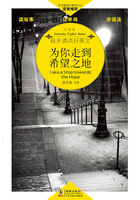
生活不是理所当然Not Being Grateful without Missing
佚名/Anonymous
All of us have read thrilling stories in which the hero had only a limited and specified1time to live. Sometimes it was as long as a year;sometimes as short as twenty-four hours, but always we were interested in discovering just how the doomed2man chose to spend his last days or his last hours.I speak, of course, of free men who have a choice, not condemned3criminals whose sphere of activities is strictly delimited.
Such stories set up thinking, wondering what we should do under similar circumstances. What associations should we crowd into those last hours as mortal beings?What happiness should we find in reviewing the past, what regrets?
Sometimes I have thought it would be an excellent rule to live each day as if we should die tomorrow. Such an attitude would emphasize sharply the values of life.We should live each day with a gentleness, a vigor4,and a keenness of appreciation which are often lost when time stretches before us in the constant panorama of more days and months and years to come.There are those, of course, who would adopt the epicurean motto of"Eat, drink, and be merry",most people would be chastened by the certainty of impending death.
Most of us take life for granted. We know that one day we must die, but usually we picture that day as far in the future, when we are in buoyant health, death is all but unimaginable.We seldom think of it.The days stretch out in an endless vista.So we go about our petty task, hardly aware of our listless attitude towards life.
The same lethargy, I am afraid, characterizes the use of our faculties and senses. Only the deaf appreciate hearing, only the blind realize the manifold blessings that lie in sight.Particularly does this observation apply to those who have lost sight and hearing in adult life.But those who have never suffered impairment of sight or hearing seldom make the fullest use of these blessed faculties.Their eyes and ears take in all sights and sound hazily, without concentration, and with little appreciation.It is the same old story of not being grateful without missing.
我们都读过一些令人兴奋激动的故事,故事的主人公只能再活一段很有限的时光。有时长达一年,有时却短至24小时。但是在探究这个将要离世的人选择怎样度过他最后岁月的问题上,我们都充满兴趣。当然,我说的是有选择权利的自由人而不是死刑犯。死刑犯的活动范围是受严格限制的。
这样的故事使我们思索,如果我们自己处在相似的情况下,应该做什么呢?临死之时,什么样的事情、体验和关系该被放入最后的时光中呢?回忆往昔,什么使我们快乐开心呢?什么又使我们悔恨抱憾呢?
有时,我常这样想,每天活得要像明天即将死去一样,这或许是一个非常好的规则。这样的态度可以鲜明地强调生命的价值。我们应该活得优雅从容、朝气蓬勃、观察锐敏,而这些将会日复一日,月复一月,年复一年地慢慢丢失。当然,也有一些人一生只是“吃、喝、享受”,然而,大多数人们在得知死亡的确存在时都会有所收敛。
我们大多数人认为生活是理所当然的。我们知道总有一天要面对死亡,但总认为那一天还在遥远的将来。当我们身强体健时,死亡好像是不可想象的,我们很少考虑它。日子多得好像没有尽头。因此,我们一味忙于琐事,却没有意识到这种对待生活的态度太盲目。
我担心同样的冷漠也存在于我们对自己所有官能和意识的使用上。只有聋子能够欣赏听力,只有肓人体会得到看见事物的乐趣。这种研究特别适合那些在成年时丧失了视力与听力的人。而那些从未体会过丧失视力和听力之苦的人们,很少能充分使用这些美好的官能。他们心不在焉,也不太感兴趣,用眼睛和耳朵模糊地看着和听着周围的一切。正如人们不知道珍惜自己拥有的,直到失去了才明白它的价值一样,人们只有在病的时候,才意识到健康的好处。